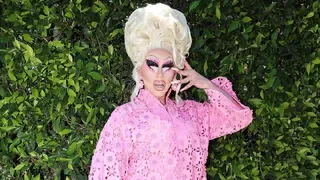September 5, 2015
Redmayne Impresses in 'The Danish Girl,' but With Controversy
Jill Lawless READ TIME: 3 MIN.
Eddie Redmayne is perfect casting for "The Danish Girl," in all respects but one.
His character in the fact-based drama, Lili Elbe, was born Einar Wegener in late 19th-century Denmark and became one of the first people to undergo gender reassignment surgery. Redmayne is an acclaimed, Academy Award-winning actor - but he's not a transgender woman, and some trans activists have expressed unease at his casting in the historically important role.
Director Tom Hooper acknowledged Saturday that the film industry has "a problem" including transgender actors.
"There is a huge pool of talented trans actors and the access to parts is limited," Hooper told reporters at the Venice Film Festival, where "The Danish Girl" is getting its world premiere.
Hooper said there are two transgender actors in the film, both in non-trans roles. But for the lead, he never wanted anyone other than Redmayne, with whom he worked on big-screen musical "Les Miserables."
"Eddie was my instinctive choice," Hooper said. "I've worked with him before (and) I'm incredibly excited by him as an actor."
And, he added: "I do think there's something in Eddie that's drawn to the feminine."
Redmayne took the responsibility of playing Lili seriously, and met many transgender men and women in preparation for the role.
"Their kindness and their support sort of galvanized me," he said.
"The entire experience for me was the most brilliant education on many, many things."
Tracing Lili's journey from denial to acceptance to rebirth in the face of a hostile society, "The Danish Girl" sensitively depicts a journey of self-discovery undertaken without a road map.
The film is already generating talk of a second Oscar for Redmayne, who won the best-actor trophy this year for playing scientist Stephen Hawking in "The Theory of Everything."
Swedish actress Alicia Vikander, who plays Einar's artist wife Gerda, is also a likely awards contender. Hooper said Gerda was an "extraordinary" character whose love for her husband - and artistic talent - made Lili's emergence possible.
Hooper said Gerda's importance to Lili's story underscored the film's theme: "the inclusion that is made possible through love."
"We live in a deeply divided world," said Hooper, who won a directing Oscar in 2011 for "The King's Speech."
"I mean, what's happening on the shores of Europe at the moment, the extraordinary refugee crisis that reaches out to us at the moment, is an appeal to our hearts.
"What happens to transgender men and women when they suffer persecution, when they suffer indignity, what's happening with the instances of violence in the U.S., is an appeal to our hearts.
"What I hope the film shows is the only way to make possible inclusion, really, is through compassion and love," he said.







